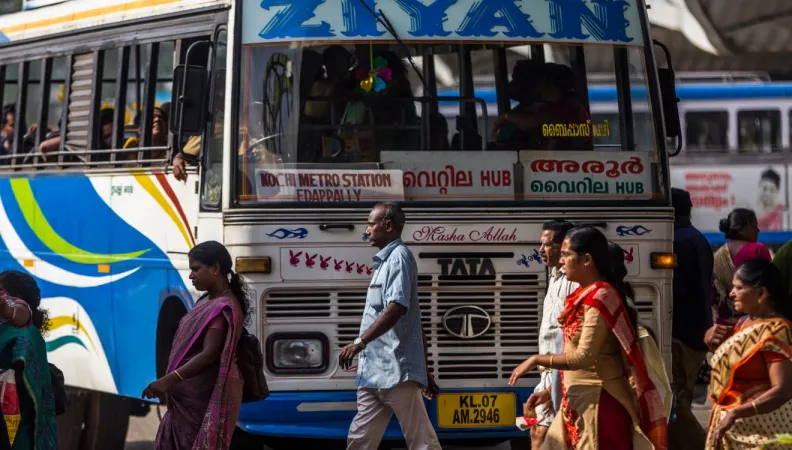Share the page
Reducing urban greenhouse gas emissions through sustainable urban mobility planning
Project
This project is carried out with the support of the European Union



-
Project start date
-
Status
Ongoing
-
AFD financing amount
-
€ 3 500 000
-
Country and region
-
Location
-
Kochi, Nagpur, Ahmedabad
-
Type of financing
-
Beneficiaries
-
MoHUA, Kochi Municipal Corporation, Ahmedabad Municipal Corporation, Nagpur Smart and Sustainable City Development Corporation Ltd
This project is carried out with the support of the European Union

The content of this project information sheet falls under the sole responsibility of the AFD and does not necessarily reflect the opinions of the European Union.
AFD is working with three pilot cities in India to develop comprehensive urban mobility plans to reduce greenhouse gas emissions via a grant delegated by the EU’s Asia Investment Facility.
Context
With 1.2 billion inhabitants and 40 cities with a population of over one million inhabitants, India has become the third global source of greenhouse gas (GHG) emissions. Given the challenge of sustaining its rapid economic growth while dealing with the global threat of climate change, the Government of India released a National Action Plan on Climate Change (NAPCC) in 2008, outlining existing and future policies and programmes related to climate mitigation and adaptation. Among other challenges, this action plan addressed the need to incentivise the use of public transportation, notably through better urban planning and modal shift through long-term transport plans.
However, most cities do not have a long-term comprehensive urban transport strategy or proposals for specific projects are not integrated with other urban transport measures or land use patterns. This results in traffic congestion and air pollution in cities.For this reason, India has been investing heavily in urban transport infrastructure over the past few years and is looking to reduce its contribution to the global GHG emissions.
Description
MobiliseYourCity (MYC) is part of an international initiative supported by the French and German governments launched at the 21st Conference of Parties (COP21) in December, 2015. Based on a proposal made by AFD in 2015, the European Union agreed to provide funds of €3.5 million through the AFD to contribute to specific investments and technical assistance components within the MYC programme in India. In India, MYC will support three pilot cities - Nagpur, Kochi and Ahmedabad - in their efforts to reduce their Green House Gas (GHG) emissions related to urban transport.
To do this, the project will support these cities with the implementation of urban mobility plans at the local level. At the national level, this project will contribute to improvements to the nation’s sustainable transport policy. A technical assistance component will support the three pilot cities as well as the Ministry of Housing and Urban Affairs with the planning and implementation of sustainable urban transport projects, strengthening institutional capacity around urban mobility planning and permitting learning and exchanges with other cities across India on best practices.
Impacts
- Local bodies and politicians have an improved sense of ownership of their comprehensive urban mobility plans thanks to inclusive and participatory processes behind the creation of these plans.
- Urban local bodies have the capacity and skills to effectively implement and monitor their urban mobility plans and their impact.
- Urban transport policies include a reduction in GHG emissions as part of their climate change mitigation agenda.


